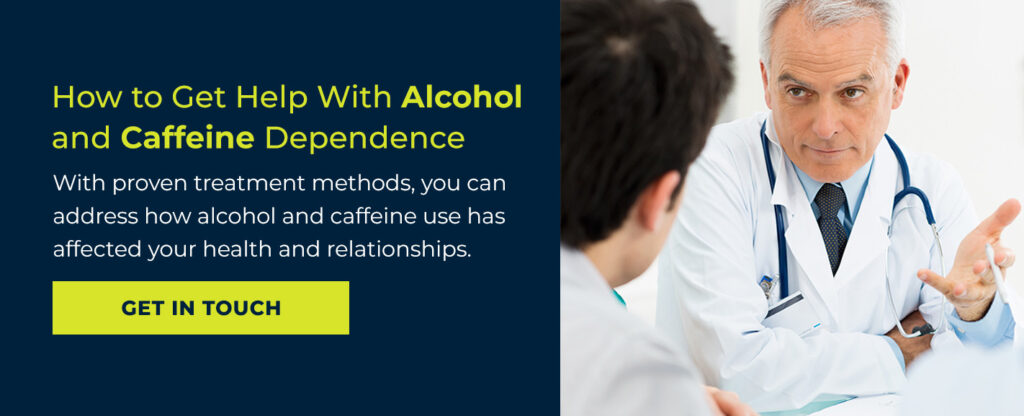- Aug 29
- Uncategorized
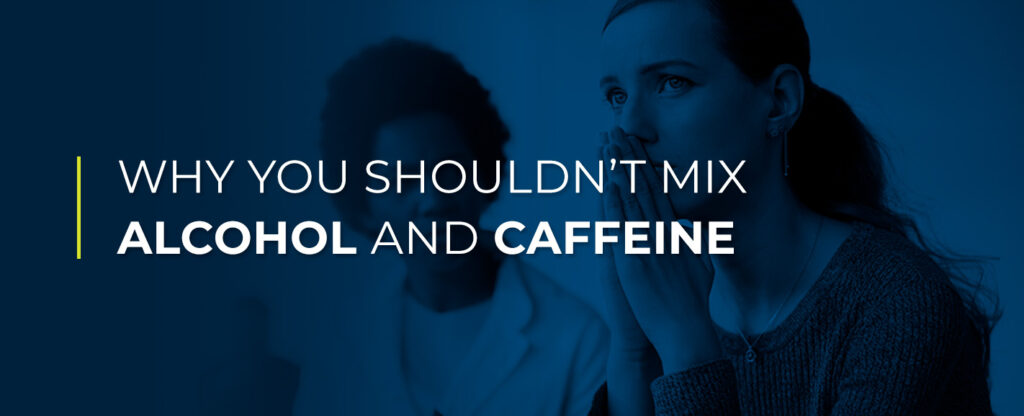
It’s not uncommon for individuals to mix their caffeine with alcohol while drinking, and once-popular caffeinated alcoholic beverages (CABs) encourage this behavior further. However, alcohol and energy drinks or other types of caffeinated beverages can introduce some unwanted consequences. Even drinking coffee after alcohol or consuming it hours before heading to the bar can produce these same harmful effects, which is why it’s best to avoid consuming these two beverages together.
If you need information and guidance on quitting alcohol and caffeine at the same time, Gateway Foundation can help. Learn more about the combination of alcohol and caffeinated beverages, how it can affect your body and how you can stop dependence before it spirals out of control.
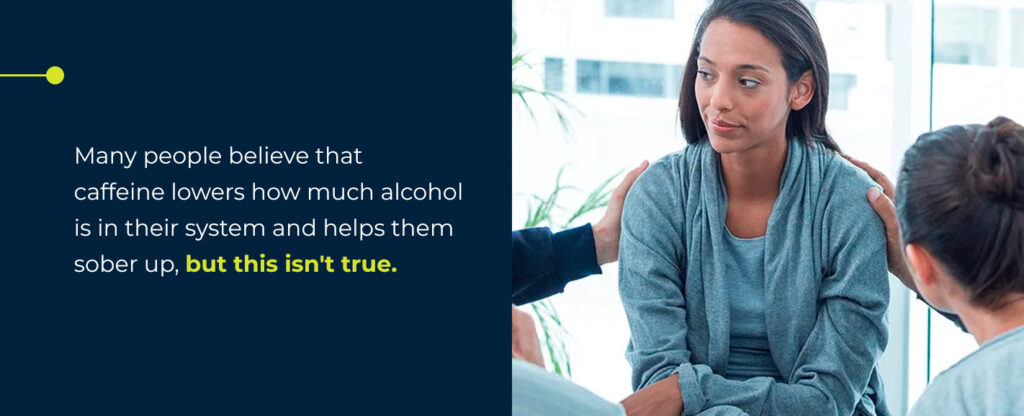
What Happens When You Mix Alcohol and Caffeine?
Many people believe that caffeine lowers how much alcohol is in their system and helps them sober up, but this isn’t true.
When you drink a CAB or mix alcohol and caffeine, you’re combining a central nervous system stimulant — caffeine — with a central nervous system depressant — alcohol. Alcohol slows your reactions and makes you feel drowsy, impairing your coordination, speech, cognitive processes and more. In contrast, caffeine makes you feel more alert, with an increased heart rate, excitability or anxiety, sleeplessness and more.
With these opposing substances in your body simultaneously, they do not cancel each other out like many may think. Instead, caffeine can “mask” alcohol’s effects and make an individual feel more alert — without actually cutting the alcohol content in their system. This effect can make them believe they can handle more alcohol. As a result, they may drink more and therefore risk dangers like alcohol-induced injuries, accidents or alcohol poisoning.
Some documented behavioral effects associated with mixing alcohol and caffeine include:
- Increased binge drinking: Individuals between 15 and 23 who mix alcohol with high-caffeine energy drinks have a four times higher chance of binge drinking, with 6+ drinks consumed during an episode.
- Increased risky behaviors: One study of 602 undergraduates revealed that students who regularly consumed energy drinks were more than twice as likely to have alcohol-related incidents than students who didn’t consume energy drinks. These instances include riding with a drunk driver, becoming injured or sick to the point of needing medical attention and having more episodes of intoxication in a week.
- Higher chance of sexual assault: In the same survey as above, researchers found that students who drank CABs had a higher prevalence of reporting that they received unwanted sexual advances while inebriated. Individuals also had a higher chance of directing unwanted sexual advances at someone else when mixing alcohol and caffeine. More research shows that sexual assaults are more likely to happen in environments where attendees consume alcohol, like bars or parties.
Alcohol can foster dependence on its own, but mixing it with caffeine could increase your potential to develop an addiction. Some studies have shown that individuals who frequently drink caffeine experience withdrawal symptoms after quitting, such as headache, irritability, flu-like effects and fatigue. Caffeine drinkers can also build a tolerance over time and require higher amounts of the substance to continue feeling its effects.
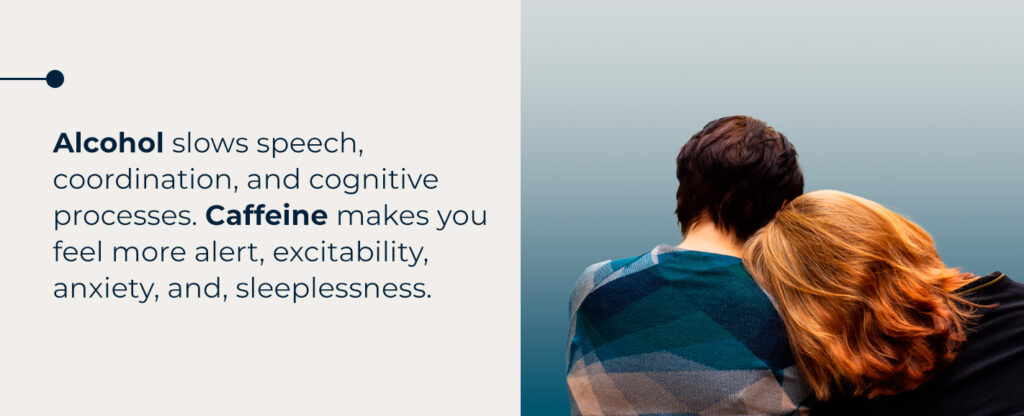
How It Affects Your Body
Alcoholic beverages and caffeine can have numerous detrimental impacts on the body, both long- and short-term. Consuming these combined drinks over a long period can lead to lasting health complications that affect multiple systems in your body. These health issues go hand in hand with the fact that many people who mix alcohol and caffeine also binge drink, which can seriously harm your liver and other organs and comes with numerous health and safety risks.
Not all people who binge drink have alcohol use disorder, but this behavior increases a person’s risk of developing an addiction. Alcohol addiction is considered a progressive disease with various degrees, and your health will worsen the further along you are. This phenomenon is why it’s essential to know how alcohol and caffeine use affect your health to prevent or stop conditions before they progress.
Find out more about how caffeine and alcohol affect the nervous system and other bodily systems below:
Dehydration
Alcohol and caffeine are diuretics, causing you to urinate more often. If you don’t consume any water while drinking, excessive urination can lead to dehydration, characterized by dry mouth, thirst and lightheadedness or dizziness. Dehydration has adverse effects on your skin and overall body, facilitating poor kidney function, muscle cramping, shrunken blood vessels in the brain and confusion in moderate to severe cases.
Drinking coffee when you have a hangover could make you feel more alert, but it may also exacerbate your hangover symptoms or cause them to last longer because it can dehydrate your body.
Alcohol Poisoning
With caffeine blocking you from experiencing alcohol’s effects, you may become inclined to drink more than you otherwise would. Although you may not feel inebriated, your blood alcohol content will continue rising as you drink. Drinking more than you usually would opens you up to the risk of alcohol poisoning, which can prove fatal if not treated immediately. Some common symptoms of alcohol poisoning include:
- Seizures
- Vomiting
- Slowed breathing, with less than eight breaths per minute
- Unconsciousness
- Low body temperature
Heart Problems
Combining alcohol and caffeine can increase your blood pressure. Raised blood pressure can heighten your risk of other cardiovascular conditions such as heart disease, heart attack, irregular heartbeat or stroke. People who already have an irregular heartbeat should stay away from consuming large amounts of alcohol and caffeine.
Energy drinks increase the heart’s rate of contraction, which can be problematic for people with existing cardiovascular issues, like an irregular heartbeat. Additionally, chronic alcohol use has been linked to the presence of an irregular heartbeat, but short-term use — as in binge drinking — can also trigger this issue in a case known as holiday heart syndrome (HHS).
Sleep Issues
On its own, alcohol can create long-term sleep issues for people who regularly drink this beverage. Around 18% of people with alcohol addiction are more likely to deal with insomnia than 10% of people without alcohol use disorder. Other sleep disorders that can arise from frequent alcohol use include sleep paralysis and alcohol-induced sleep apnea.
In the short term, this substance can keep you up longer at night or cause sleep disruptions as your liver metabolizes the alcohol in your system and your blood alcohol content decreases.
Caffeine also disrupts sleep by blocking sleep-inducing receptors in your brain and interrupting the body’s circadian rhythm. Adenosine is a brain chemical that causes you to feel sleepiness. When caffeine blocks adenosine receptors in your brain, you feel alert for longer and may stay up later, as it becomes difficult to fall asleep. Caffeine is also known to interfere with deep sleep, which can leave you feeling fatigued and affect cognitive processes like memory.
Digestive System Pain
Alcoholic gastritis occurs from alcohol use and is a condition in which the stomach’s lining becomes irritated and inflamed. Over time, regular episodes of alcoholic gastritis could even cause your stomach lining to erode. It can manifest as an acute, painful irritation or become a chronic issue, which can result in you feeling fewer symptoms because your body has become used to frequent alcohol use and inflammation. With a worn stomach lining, you are also more susceptible to developing stomach ulcers.
On the other hand, caffeine can worsen existing digestive issues like irritable bowel syndrome (IBS) or cause diarrhea, which can contribute to dehydration. Like alcohol, it can also irritate your stomach and produce inflammation due to its acidic properties.
Can I Consume Them Separately?
It’s best not to consume any caffeine before or after drinking alcohol, as caffeine stays in your system for up to six to 10 hours after your initial consumption. As a result, it can still influence alcohol’s side effects on the body hours after it was first consumed. How long alcohol will stay in your system depends on a range of variables, such as body weight, gender, medications you’re taking and more, which makes drinking these two beverages together even more volatile.
Additionally, the type of caffeinated drink you consume will factor in how it affects your system, meaning you may not experience the same effects across all caffeinated beverages. Your bodily responses may heighten with an increase in caffeine, meaning that drinking a high-caffeine beverage and alcohol separately likely won’t reduce this effect. Caffeine levels in various drinks can differ greatly — even in the same types of beverages.
For example, an 8-ounce cup of instant coffee typically has around 62 milligrams (mg) of caffeine, while brewed coffee can have about 96 mg of caffeine. Green tea generally has less caffeine than black tea, but matcha varieties can still have high levels because of the tea leaf growing and brewing processes. Energy shots have much more caffeine than tea or coffee, with over 200 mg.
You cannot control or predict many of these variables, which is why it’s not a good idea to drink caffeine and alcohol in the same day. Both substances begin working relatively quickly within the body but can remain in your system for a while after consumption.
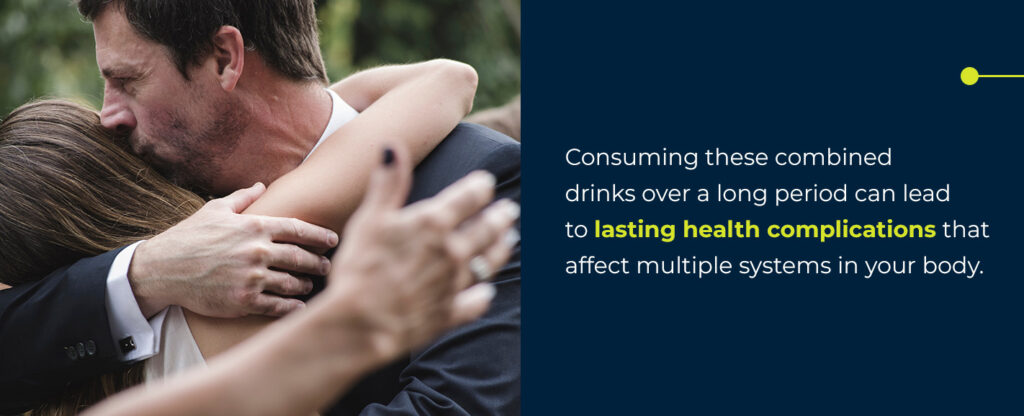
Examples of Caffeine and Alcohol
The Food and Drug Administration (FDA) sent out communications to four businesses in 2010 informing them that the use of caffeine in their alcoholic malt products was considered unsafe and could result in the seizure of their goods. These businesses were Drink Four Brewing Company, Charge Beverages Corporation, United Brands and New Century Brewing Company, LLC.
Some popular CAB products that these businesses sold — and subsequently removed the caffeine from — include:
- Four Loko
- Moonshot
- Max
- Core High Gravity
- Joose
In addition to the caffeine masking the alcohol’s effects, these types of beverages often had a higher alcohol content than beer. For example, a beer product may have an alcohol by volume (ABV) of 5%, while a CAB could have a 12% ABV.
With increased alcohol consumption being linked to risky behaviors and significant injuries, these higher ABVs in CABs had the potential to exacerbate alcohol-related incidents and heighten intoxication. This concern was bolstered by the fact that CABs contained other stimulants in addition to caffeine, like taurine, guarana and ginseng.
Other types of caffeinated alcohol include beverages that individuals can make themselves, giving them easy access to substances that can facilitate health and safety issues. Some of these common drinks are:
- Espresso martinis
- Irish coffees
- Vodka Red Bulls
- Rum and Cokes
- Jägerbombs
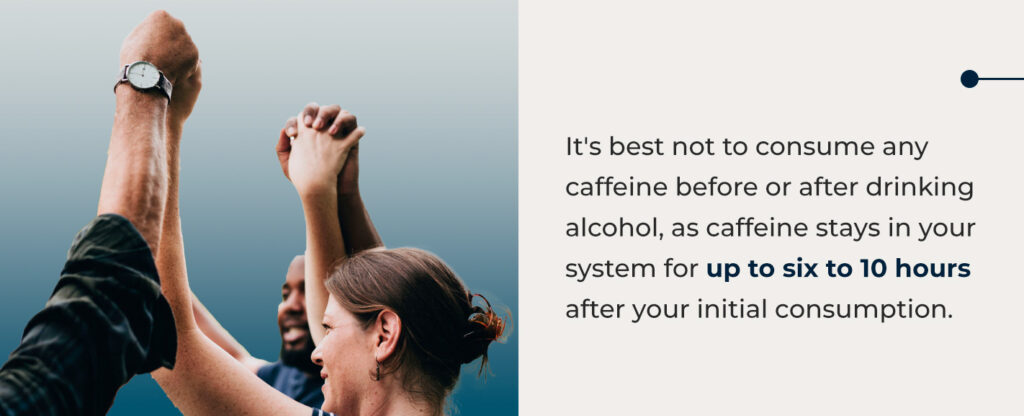
How to Get Help With Alcohol Addiction and Caffeine Dependence
If you’ve already been drinking CABs or mixing alcohol and caffeine for a long time, you may feel that it’s difficult to stop or manage this behavior. It can be hard to recognize that you’ve developed a dependence on these substances. However, you can receive help at any time — it’s never too late to make a change in your life.
Consider these steps if you’re looking for ways to get control of alcohol dependence:
- Examine your drinking habits: If your drinking is starting to interfere with your life and relationships, cause you financial troubles or facilitate episodes of depression or guilt, these are signs that you may have an alcohol addiction.
- Create a plan of action: Having an action plan makes it easier for you to follow through on your objectives and start taking concrete steps to stop drinking. Your plan can involve goals such as completing detoxification in a rehabilitation program and starting counseling sessions to maintain your recovery.
- Change your routine: Identifying patterns in your routine that feed into your addiction can help you with forming new habits to avoid triggers and steer yourself away from drinking alcohol. For example, if having a caffeinated alcoholic drink is one of the first things you do after getting home from work, you could break this pattern with a simple change like starting on dinner or taking a shower instead.
If you’re struggling to manage your dependence or stop drinking on your own, seeking help from professionals equipped to deal with alcohol addiction is an excellent step to take. You can have confidence knowing you can do this in a judgment-free, caring environment. At Gateway Foundation, we are with you for life. We provide a comprehensive care continuum tailored to each individual to assist with your unique situation and needs. Our evidence- and science-based treatments provide solutions that facilitate long-term recovery outcomes.
Contact Gateway Foundation for More Information
Breaking the hold addiction has on your life is possible — all you need to do is take the first step to get there. With support from peers and proven addiction treatment methods, you can address how alcohol and caffeine use has affected your health and relationships and leave behind the dangers of these substances.
If you want more information on how alcohol and caffeine affect the body or need help recovering from alcohol addiction, reach out to Gateway Foundation today. Our compassionate experts in addiction recovery can help you get back to your life before addiction and discover a renewed sense of self.

